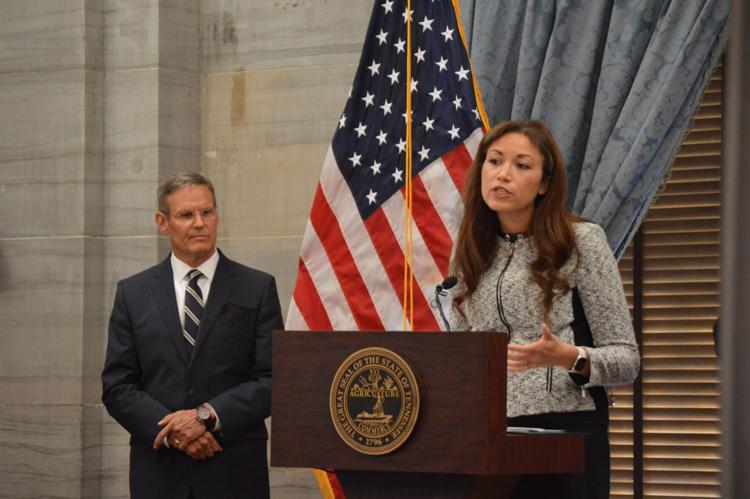Photo: Tennessee Commissioner of Education Penny Schwinn speaks during a news conference with Gov. Bill Lee at the state Capitol on Thursday, Aug. 6, 2020.
The Center Square [By Vivian Jones] –
While the Tennessee Department of Education has said temporarily withdrawn guidance on child well-being checks was not intended to apply to every child, internal documents and emails sent in development of the guidance show officials have misrepresented the intended scope of the initiative in response to public outrage.
A guidance toolkit outlining statewide Child Well-being Checks was developed by the COVID-19 Child Well-being Task Force and released Aug. 11. Within three days, the department had withdrawn the program after uproar over perceived big-brother style government overreach.
In response to concerns over the initiative’s application to all children in the state – birth to age 18 – the state repeatedly has claimed the guidance document did not accurately portray the intent of the program.
The guidance “has nothing to do with children who are homeschooled or enrolled in independent schools,” an official statement sent to The Center Square by Gov. Bill Lee’s office and the Department of Education read.
In a letter sent Aug. 14 to members of the General Assembly, Education Commissioner Penny Schwinn wrote the guidance applied only to at-risk students.
“The goal of this document was to serve as an optional resource for local leaders to guide their efforts for at-risk kids who continue to navigate prolonged time away from the classroom,” Schwinn wrote. “Although well-intentioned, we have missed the mark on communication.”
Internal documents tracking development of the well-being checks guidance and emails between department staff, however, show in every step of the drafting process, including a discussion with a group of school superintendents and circulation to members of the governor’s cabinet, the well-being checks initiative was intended to apply to every child in the state.
A document compiling feedback from the task force dated July 22 said the goal of the initiative was “100% of Tennessee children would receive a wellbeing check.” Meeting notes from the July 22 meeting show task force members strategized how to reach children birth to age five who are not in the school system.
“Talked about how to get to all children in the system, as the school system covers children age 5-18,” the meeting notes read. “Will need to think critically about how to reach children from birth to age 5.”
In an Aug. 6 draft update to the governor’s office, Katie Houghtlin, a former colleague of Schwinn at the Texas Education Agency who now facilitates the Child Wellbeing Task Force and orchestrated feedback on the well-being checks document, noted suggestions from the task force on how to administer well-being checks for nonpublic school students and children from birth to age 5.
“As the goal is to conduct a wellbeing check for ALL children, not just those enrolled in public schools, our superintendent engagement group voiced concern that they would not be able to coordinate the effort to also administer the wellbeing checks for private school students, birth to age 5, homeschooled and homebound children,” Houghtlin wrote, noting the task force suggested superintendents be able to designate an administrator of well-being checks.
Talking points to a Superintendent Engagement Group shared by Whole Child Chief of Programs Jean Luna in an Aug. 7 email reiterated the goal to conduct a well-being check for all children, including private school students, homeschooled students and homebound children.
“Further conversation emphasized the intention of the Child Wellbeing Task Force was to check in on all children in communities from birth to 18 which would include students not enrolled in the public school system,” Luna wrote.
The final released guidance clearly stated the goal that all Tennessee children receive a well-being check. Before its release Aug. 11, guidance was discussed with a group of school superintendents and circulated to the 38 member COVID-19 Child Wellbeing Task Force and six of Lee’s cabinet members for feedback.
Participation in the well-being checks initiative was almost not optional.
A week before the initiative was launched, Houghtlin emailed Schwinn a progress report on the document, including details of a conversation Houghtlin had with Schwinn’s assistant, Chelsea Crawford, surrounding the document.
“Chelsea and I landed on a strategy to ‘encourage’ but not require checks so we can use data collected from counties who committed and implemented with fidelity to demonstrate possible benefit in creating county specific wellbeing committees which could serve far beyond COVID,” Houghtlin wrote.
While the final guidance document included a specific provision that participation in well-being checks not be forced or mandated, the document did state parents choosing to decline to respond to a well-being check inquiry would be recorded as not participating.
The department withdrew the guidance days after it was released and since has repeatedly claimed the truly limited intent of the well-being checks program was not accurately communicated in the final copy.
“The intent is that we have vulnerable students across the state who have not been in school for 6 months. Schools, as you well know, are places where many of our students receive breakfast, lunch, and sometimes supper, mental health services and other supports,” Schwinn said during a news conference last week.
“This toolkit, like the 40-something that came before it, was intended to give districts a guide, a toolkit, to be able to make local decisions about what makes the most sense for their students,” Schwinn said.
The department is continuing work on a revised version of the toolkit, but, as of Thursday, Schwinn did not have a timeline for the toolkit’s re-release.
The governor’s office did not respond to a request for comment.


